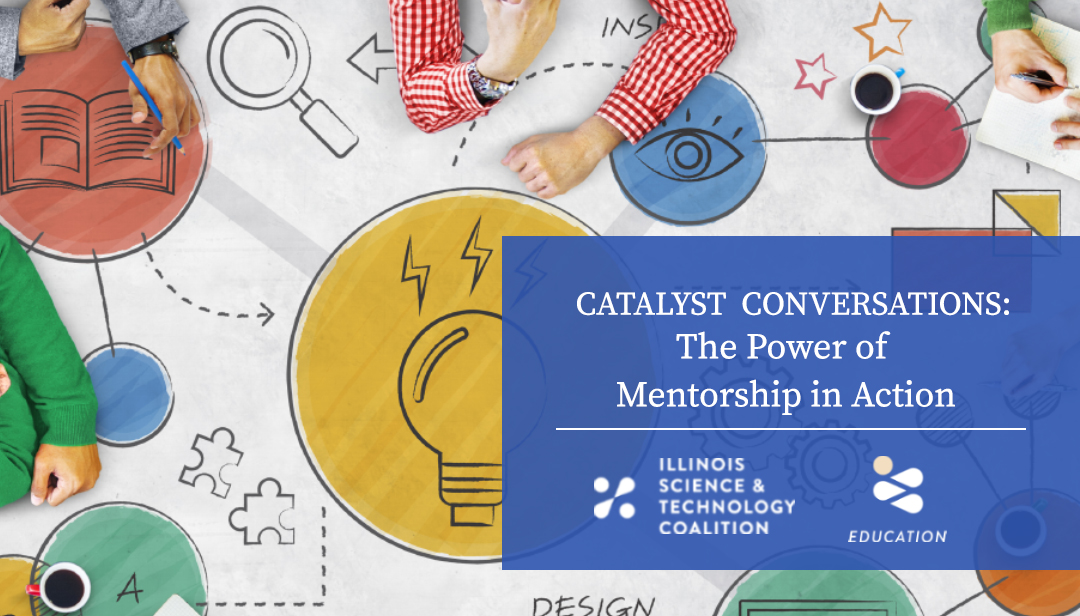THE POWER OF MENTORSHIP IN ACTION
On November 18, 2021, the Illinois Science and Technology Coalition, in partnership with The Darkest Horse, hosted the first-ever Mentor Summit — a virtual opportunity for leaders to collaborate, examine, and reflect on best practices within the mentorship space.
In this month’s Catalyst, we discuss mentorship in different facets of life, its importance on the community, and ways for everyone to give back, with Emily Cooper, Director at ISTC Education.
When it comes to mentorship, it’s easy to think of the standard definition of one-on-one guidance between a younger and older individual. However, in 2021, mentorship has expanded into something much greater and all-encompassing. In fact, mentorship has started to extend and embed itself more into corporate culture, with employees that stayed with their employer for more than five years being twice as likely to have a mentor.
And of course, the impact that mentors have on the young talent within the community, is easy to see. The STEM talent pipeline is one example of where mentoring can make all the difference. In states like Illinois, this partnership between future leaders and current ones is especially important, with Illinois STEM graduates, making up 19% of all grads.
Inspiring future leaders who are smart, capable, and driven, is a goal for many corporate mentors and can be an excellent way to give back to the community. By sharing wisdom and experiences, mentors have the unique opportunity to mold the minds of tomorrow, to ensure an equitable and innovative future.
In this edition of Catalyst, we spoke with Emily Cooper, Director of ISTC Education, to learn more about the importance of mentoring in various environments and the role ISTC plays.

Emily Cooper, Director of ISTC Education
For those who missed it, what was the Mentor Summit and what were its primary goals?
The 2021 Mentor Summit, in partnership with The Darkest Horse, centered on best practices for mentors and mentorship facilitators to intentionally create space to empower mentees and tailor their relationship-building experiences to authentically align with the mentees’ personal identity and professional goals. This inaugural event sought to increase mentor awareness through analyzing best practices from nationally and locally renowned organizations.
Mentor Summit featured keynote speaker Molly Matthias, Associate Director of Development at Facing History and Ourselves, who shared the blueprint for inclusive mentorship with her talk, “The DNA of a Great Mentor.”
The featured presenters of the day carried on this conversation with Jennifer Tani, Director at The Posse Foundation Chicago, Xavier Mann, Senior Manager of Program Supports at One Million Degrees, Chanté Martinez Thurmond and Rada Yovovich, Co-Founders of The Darkest Horse, and the Illinois Science and Technology Coalition CEO Colleen D. Egan, focusing on critical reflection and tangible takeaways.
Attendees commented on the “variety of speakers, excellent presentations, thought-provoking ideas,” “great span of being both human and systemic,” and “the content and energy.”
Why is mentorship so important and In what ways do you see mentorship creating the most impact within the work of ISTC Education?
Growth and opportunity come from expanding your connections and building relationships. You cannot be what you cannot see. It takes intentional commitment from a community to work together to provide access to programming and resources to build a more inclusive, diverse talent pipeline. Each year approximately 75% of ISTC Education student participants report that our programs are their first opportunity to connect with a professional mentor. Our programs are an access point, and we are intentional about working with students who have historically been excluded from STEM, and workforce skill-building opportunities. By creating that entry point, students learn about careers they weren’t aware of, and how their own personal experiences and skills connect with the workforce. They learn how to communicate externally with those outside of their network, and are able to see how they fit into the overall STEM ecosystem.
In your experience, what characteristics make for a great mentor?
Empathy and an investment in creating a trusting, open environment with your mentee are important characteristics regardless of the mentoring opportunity. Mentoring is defined differently by different people and organizations but one thread that weaves through all mentorship is the importance of seeing, hearing, and valuing your mentee for who they are. As a mentor, leading with empathy means considering the mentee to be a teammate, and setting expectations and goals together. By going into the experience without preset expectations, which can be influenced by biases, the relationship can build on a foundation of mutual understanding and partnership.
“ One thread that weaves through all mentorship is the importance of seeing, hearing, and valuing.”
What advice would you give to someone interested in getting involved with mentoring?
Consider what you hope to share and what you hope to gain from the experience. The most powerful mentorship is when there is shared learning and growth. ISTC believes in the impact of skills-based mentorship, which allows mentors to share their expertise, passions, and interests in a way that enhances the knowledge and understanding of their mentee. At the same time, the mentor is gaining unique feedback, perspectives, and thought partnership from the mentee. Having a shared goal or outcome gives you something concrete to work together to achieve, which assists with initial communication and relationship building.
What are some ways for corporate partners to get involved with mentorship?
ISTC has many opportunities for mentor engagement, starting with our K-12 STEM education programs. During the academic year, mentors can get involved through our Mentor Matching Engine and our STEM Challenge programs. The Mentor Matching Engine is ISTC Education’s proprietary, project-based platform that virtually connects students with professional mentors for long-term engagement. Safety is at the forefront of the platform, with automated background checks, and teacher oversight. Students are able to select a mentor to connect with virtually whose expertise matches their project topic. Student projects range in topics from engineering to nanotechnology to social science to app development, and we are always looking for mentors as this program rapidly expands. Our other academic year program is our STEM Challenge program which partners high schools from across Illinois with innovative companies to solve an industry authentic problem.
Finally, ISTC Education’s The 6×3 Project is 6 weeks, 3 organizations, one high impact program aimed at high school students. This program is designed to build relevant and real-world skills in STEM and entrepreneurship. The 6×3 Project exposes students to a real industry challenge, in-depth coding experience, and business and entrepreneurial models to equip students with tangible skills to produce a viable product.
“ Consider what you hope to share and what you hope to gain from the experience.”
How can mentoring give back to the community?
Investing in the next generation of innovators goes beyond just giving back. Mentoring is an opportunity to shape the future of work; to share knowledge, experiences, and opportunities with students from across the state to build a more equitable and diverse future. Mentors in our programs have inspired students to study majors they didn’t know existed, to pursue careers they had never heard of, and design solutions to problems they had never explored.
To learn more about how to get involved with ISTC Education’s mentoring opportunities please contact [email protected].

